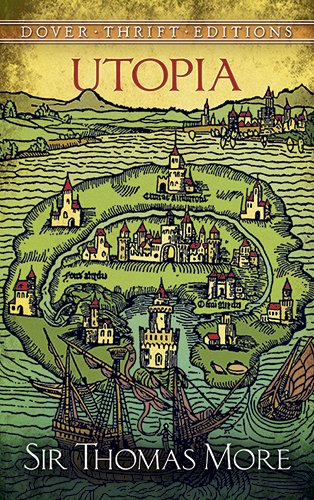

Cavendish’s looking-glass utopia anticipates the world of Lewis Carroll’s Alice books in a number of startling ways. But The Blazing World, published in 1666 when London was quite literally ablaze with the Great Fire, is her most representative utopian work, a fictional account of a young woman’s fantastic voyage to an alternative world, which she accesses via the North Pole. Cavendish’s work is frequently interested in the idea of utopia, such as the all-female university she imagines in The Female Academy and The Convent of Pleasure, in which a group of women remove themselves from society in order to devote themselves to a life of pleasure. Recommended edition: Three Early Modern Utopias Thomas More: Utopia / Francis Bacon: New Atlantis / Henry Neville: The Isle of Pines (Oxford World’s Classics)

Available in Three Early Modern Utopias Thomas More: Utopia / Francis Bacon: New Atlantis / Henry Neville: The Isle of Pines (Oxford World’s Classics) along with More’s Utopia and another early utopian novel, Henry Neville’s The Isle of Pines. It was published posthumously in 1627 and outlines a perfect society, Bensalem (its name suggesting Jerusalem) founded on peace, enlightenment, and public spirit. Although he never completed it, this utopian novel by one of the great philosophers of the Elizabethan and Jacobean eras is well worth reading. Mind you, given that in Utopia adulterers are taken into slavery, and repeat offenders are executed, it makes you wonder whether More’s Utopia isn’t more dystopian than anything… Recommended edition: Utopia (Penguin Classics) More’s island utopia has variously been interpreted as a sincere description of the perfect world and as a satirical work poking fun at the world’s excessive idealists. This 1516 work is the book that gave us the word ‘utopia’ – from the Greek meaning ‘no-place’, though with a pun on eu-topos, ‘good place’, implying that such an ideal society is too good to be true. Recommended edition: Republic (Oxford World’s Classics) The book also discusses various possible forms of government, discussing the advantages and disadvantages of each. The Republic sees Socrates debating with a number of other people about the nature of justice and the ideal city-state. In a sense, the utopian genre might be said to begin with Plato’s Republic, in which he sets out his ideal society (famously, no poets were allowed). It’s to the point where Timothée Chalamet is promoting his movies by saying stuff like “societal collapse is in the air.”īut, at the same time, we’re still seeing pretty incredible advances in many areas of technology, and economic progress continues its march forward.Plato, Republic. Depopulation is coming for many of the world’s largest economies. One big social revolt after another has unfolded, in every part of the globe, with no signs of stopping. In this time, stock valuations went wild, but real GDP growth stagnated. It does what all the best nonfiction books do: change the way you understand the world around you.įor me, the most important thing the book did was help me understand a feeling I’ve had since around 2010-this turns out to be an important year for DeLong-that human progress is faltering. If you want highly credible answers to these massive questions, I recommend Slouching Towards Utopia-a new book that came out to critical acclaim this week by economist Brad DeLong. But what if we’re living through a bigger shift that requires a longer lens to see? What if our economic future does not fit a simple extrapolation of the recent past? What if the tectonic plates of civilization are moving beneath us in a way that you need to go back centuries to understand? I extract lessons from the events of the past few years (occasionally longer) so we can better understand what might happen next. This newsletter is normally about how technology businesses are evolving, and can succeed or fail through strategy.

Every once in a while it’s good to zoom out.


 0 kommentar(er)
0 kommentar(er)
